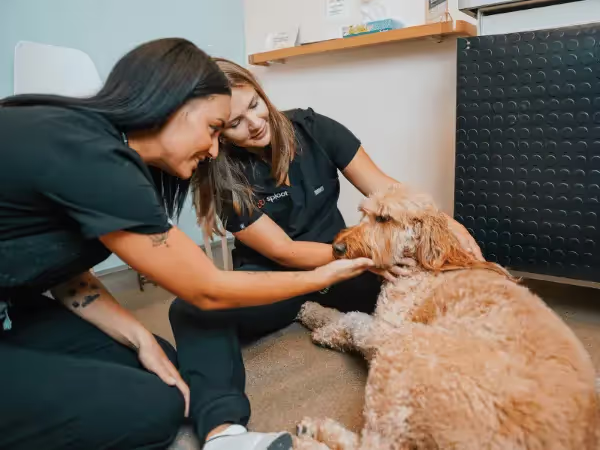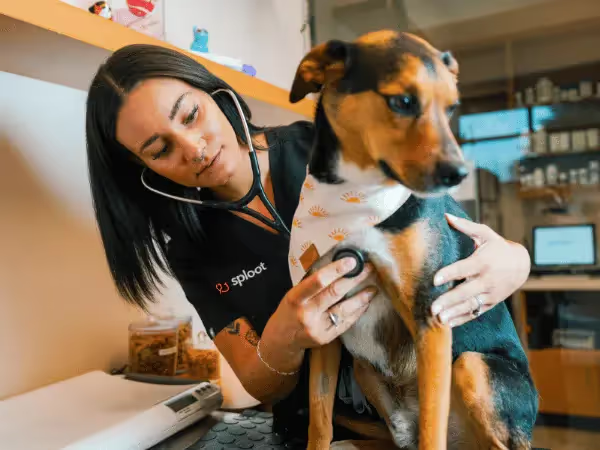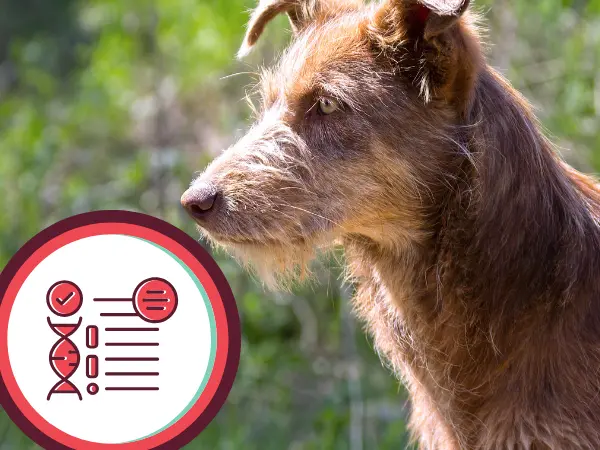Hearing your dog coughing can be concerning, especially if the coughing is severe or persistent. In some cases, it’s a simple throat irritation, but other times it may signal an underlying health issue that needs veterinary attention.
Many pet parents search for answers to questions like “why is my dog coughing?” and this guide is here to provide some answers. This Sploot Vets guide dives into the common causes of dog coughing, when to be concerned, and how to best support your pup.
Why Is My Dog Coughing a Lot?
There are various reasons why dogs cough. Some of the common ones include:
1. Environmental Irritants
Dust, smoke, strong fragrances, and cleaning products can irritate your dog’s airways. Just like in humans, inhaling these irritants may cause temporary coughing until the particles clear. If your dog is irritated by any fumes or particles indoors, promptly take them away from the affected area and ventilate the area before bringing them back.
2. Foreign Object in Dog’s Throat
Dogs love to chew and explore with their mouths. Occasionally, small pieces of toys, sticks, or food can get lodged in the throat, triggering coughing or gagging as the body tries to expel the foreign object.
Call a veterinarian if the object doesn’t pass quickly or if your dog shows signs of distress.
3. Kennel Cough or Bordetella
Kennel cough, also known as bordetella in dogs or ‘infectious tracheobronchitis’, is a highly contagious respiratory infection that often spreads in doggy daycares, dog boarding facilities, or parks. It causes a dry, hacking cough that may persist for weeks if untreated. A vet may prescribe medication to ease symptoms or prevent complications.
Because kennel cough is contagious, some dog boarding and daycare establishments require a kennel cough or bordetella vaccination to help dogs stay safe.
4. Canine Influenza
Canine influenza, or dog flu, is a highly contagious viral infection. It typically spreads quickly in environments like dog parks, kennels, and dog boarding facilities. Coughing is one of the symptoms of canine influenza, along with dog sneezing, lethargy, and fever.
If you suspect that your dog has canine influenza, we recommend reaching out to a vet for next steps. The good news is you can protect your dog from this viral infection with the canine influenza dog vaccine, which is especially beneficial for social dogs and those that frequent dog-friendly places.
5. Pneumonia and Lung Infections in Dogs
Pneumonia and lung infections can cause inflammation in the lungs, often leading to a wet or rattling cough in dogs. Dogs with pneumonia may also seem weak, feverish, and struggle with breathing.
Such cases always require prompt veterinary treatment, with antibiotics or hospitalization for severe cases. If you suspect pneumonia or a lung infection in your dog, contact an urgent vet care provider.

6. Asthma in Dogs
Though less common, some dogs develop asthma triggered by allergens. Canine asthma causes recurring bouts of coughing and wheezing as the airways narrow. A vet can confirm the diagnosis and may prescribe inhalers or medication to manage asthma in dogs.
7. Heartworm Disease in Dogs
Spread by mosquitoes, heartworm disease in dogs damages the lungs and heart. A persistent cough is one of the earliest warning signs, along with reduced stamina.
Heartworm disease is life-threatening for dogs, which highlights the importance of heartworm preventatives. If you suspect heartworm, seek immediate veterinary diagnosis and treatment..
8. Canine Heart Disease (Heart Cough in Dogs)
Canine heart disease can also make dogs cough due to two complications: fluid buildup and an enlarged heart.
Sploot Medical Director Dr. Molly Wozniak explains: “Typically, fluid buildup due to heart disease does NOT cause a chronic cough in dogs; instead, it causes acute respiratory distress [characterized by rapid, shallow breathing, coughing, weakness, and bluish gums].”
She continues: “Meanwhile, an enlarged heart secondary to heart disease can elicit a chronic cough in dogs due to the compression of the trachea and bronchi within the lungs.”
If you are concerned about your dog’s cough and heart health, we recommend promptly scheduling a veterinary check-up.
9. Tracheal Collapse in Small Dog Breeds
Toy and small breeds, such as Pomeranians, Lhasa Apsos, and Shih Tzus, are prone to collapsing trachea, where the windpipe weakens and narrows. It typically causes a honking-sounding cough, especially during excitement or exercise. To ensure your dog’s health, ask your vet about helpful lifestyle changes, medication, or other options.
10. Canine Distemper
Canine distemper is a life-threatening viral disease that can cause coughing, fever, nasal discharge, and even neurological symptoms. The best way to protect your pup is by keeping their DAPP or DHPP vaccination up-to-date. If your dog shows signs of distemper, seek emergency veterinary care immediately.
Will My Dog’s Coughing Go Away On Its Own?
In some cases, mild dog coughing may resolve without treatment, especially if caused by temporary irritants. However, coughing tied to infections, heart problems, or serious conditions requires timely veterinary care.

When Should I Worry If My Dog Is Coughing? [When to See The Vet]
Contact your vet if you notice any of the following symptoms:
- Cough worsens over time – May indicate an ongoing infection or disease.
- Moist, wet, or rattling cough – Could point to pneumonia or fluid in the lungs.
- Lethargy or weakness – Suggests the body is fighting more than simple irritation.
- Appetite changes – Skipping meals often signals illness in dogs.
- Coughing blood – May indicate severe infection or internal damage.
- Gagging or vomiting – Could be linked to a foreign object or digestive complications.
- Difficulty breathing – An emergency warning sign requiring immediate attention.
Note: Does your dog have any of these symptoms? We’re here to help! Sploot Vets is a provider of same-day urgent care and emergency vet services in Chicago, Colorado Springs, and Denver. Our vet clinics are open 365 days a year, with extended clinic hours (8 AM to 8 PM). Call our team for next steps→
Final Thoughts on Dog Coughing
A dog’s coughing can mean many different things, from minor irritants to more serious health concerns. While some cases resolve on their own, persistent or severe coughing may require prompt veterinary attention. Paying close attention to your dog’s symptoms and calling a vet when needed is the best way to protect their health.

Sploot Vets: Your All-in-One Vet Care for Dogs
If you’re concerned about your dog’s coughing, we’re here to help! At Sploot Vets, we provide top-tier, all-in-one veterinary care designed with your dog’s comfort and well-being in mind. We offer preventive care, urgent care, and emergency vet services all under one roof.
In addition, our Fear Free veterinary approach makes visits more comfortable for puppies, senior dogs, and even the most anxious pets.
With vet clinics conveniently located in Chicago, Denver, and Colorado Springs, we’re open 365 days a year with extended hours—so we can be here for you when you need us most!
Easily book a vet appointment online or via the Sploot Vets pet care app.






